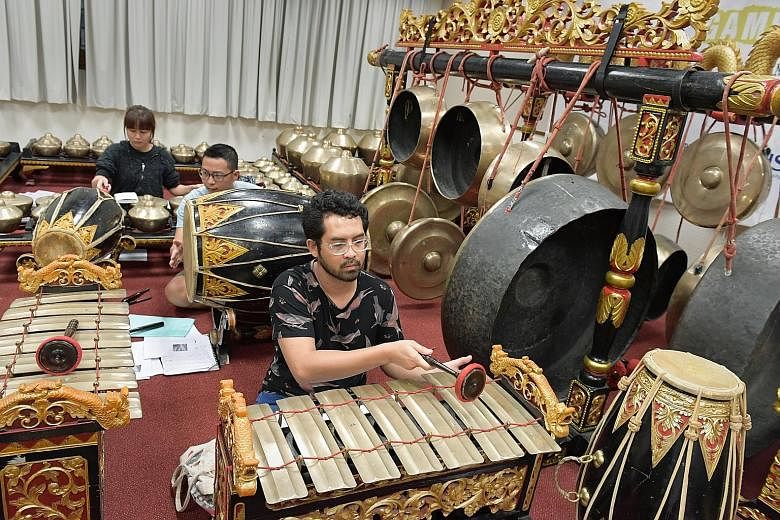As a child, Mr Suryakenchana Omar would often eavesdrop on his parents speaking in Javanese from his bedroom.
"As soon as they realised I was awake, they would switch to Malay," said the 44-year-old director of a training firm.
Mr Haider Sahle has similar memories from his childhood spent with his grandaunt. "Whenever my elders didn't want the children to overhear or understand what they were saying, they would speak in Javanese," recalled the 36-year-old production editor.
But eavesdropping helped him to pick up Javanese words and phrases.
Mr Haider and Mr Suryakenchana serve as vice-president and honorary secretary respectively of the Javanese Association of Singapore, which was formed in 2015.
There are 89,000 ethnic Javanese in Singapore, according to 2010 census records, making them the largest Malay sub-group here.
But few speak the language, said Mr Suryakenchana.He added that there may be many more Javanese Singaporeans but they now identify themselves as Malay.
According to 1825 census reports, there were only 38 Javanese residing in Singapore. But by 1891, the number had climbed to 8,541, with many first moving to Kampung Java. They assimilated quickly, picking up the more commonly spoken languages of Malay and English, said Mr Haider.
That was what happened with Mr Mohamed Saat Mokhtar's Javanese father, who emigrated to Singapore as a labourer in the 1940s. Although both Mr Mohamed Saat's parents were from Java, they spoke to their children in Malay.
"My father was looking for a better future in an environment that was alien to him," said the 53-year- old senior manager in an engineering firm. "He had to assimilate into the culture here and make sure that his children also fit in."
Now, these men want to rediscover the language and culture.
Mr Mohamed Saat has been learning Javanese primarily through conversations with his Indonesian domestic helper.
In 2010, Mr Haider started a Javanese language class with seven others under the tutelage of linguist Gloria Poedjosoedarmo. But in 2014, the classes had to be stopped due to Dr Poedjosoedarmo's poor health.
Though many are interested, Mr Suryakenchana said there are few qualified Javanese teachers here, adding that the hierarchical nature of the language makes it difficult to learn.
There are three different registers - Ngoko, Madya and Krama - and the words used differ based on the status of the audience. Ngoko is used between friends while Madya is used between strangers. Krama is used when speaking to elders and those of higher social standing.
In Ngoko, the question "What is your name?" would be "Jenengmu sapa?", while in Madya, it would be "Asmane sampeyan napa?". The same question, in Krama, would be "Asmanipun panjenengan punapa?"
Apart from vocabulary, the intonation also differs. While Ngoko is spoken in short bursts, Krama is softer and more nuanced.
"Just to say one word, you have to think through the three levels for which word to use," said Mr Suryakenchana, who also researches and gives talks on Malay and Javanese culture.
He added that while the language may be lost here, the culture lives on in the enduring popularity of batik as well as nasi ambeng, a traditional dish of a mountain of rice served with various meat and vegetable dishes on a communal tray.
Non-Javanese are also embracing aspects of the culture.
About a third of the members of the Singa Ngalaras Gamelan Ensemble - a National University of Singapore group which plays traditional Javanese music - are not of Javanese descent.
They include master's student Thow Xin Wei, 33, who started playing a decade ago. In 2010, he was given a scholarship by the Indonesian authorities to further his studies in gamelan music in Solo.
For his 25-year-old daughter's wedding next month, Mr Mohamed Saat plans to hold a traditional Javanese ceremony complete with unique rituals such as the timbang, where the couple sit on the lap of the bride's father to symbolise that he will treat both fairly.
Mr Suryakenchana said the Javanese here have not been as active as other Malay sub-groups in promoting their culture. But he holds to the Javanese philosophy of "sepi ing pamrih, rame ing gawe". "It means to work without drawing attention to yourself," he added.
Balancing two cultural identities - Javanese and Malay - is not a problem. "I'm both. I could be wearing baju kurung in the morning and a batik shirt in the afternoon," he said.


